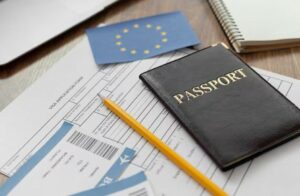This event has explore thde challenges and opportunities offered by current EU legislative frameworks and policies bolstering EU economies by way of recruiting and exchanging Non-EU and EU highly skilled workforce, professionals and talents.
Some contributions of the panelists
STUDY OF CHINESE GRADUATE
STUDENTS IN THE UNITED STATES:
A MULTIDIMENSIONAL SURVEY
PRESENTATION
ELISABETH KAMM
Enhancing EU Inclusive Growth: Strategies for Attracting Highly Skilled workforce and talents
The mobility and exchange of talents on international level is a complex issue. It is not just about economic growth and global competiveness, but also human beings whose knowledge and personal engagement we need to merit.
As long as EU governments and the EU institutions do not fully take into account the entire scale of human factors involved, no successful talent mobility scheme can ever be executed. The prospective employers and the EU governments offering visa residence permits jobs and professional careers, as well as the recruited talents and professionals, all share a stake in this complex operation and should benefit from it on equal terms.
After all, the highly qualified and talented individuals recruited to certain sectors of EU economies are human beings with their own particular cultural backgrounds, needs and expectations, rather than mechanical entities or goods. The mobility, selection, recruitment and placement of highly qualified, professionals and talents should never be regarded as simple relocation acts.
The event will explore the challenges and opportunities offered by current EU legislative frameworks and policies bolstering EU economies by way of recruiting and exchanging Non-EU and EU highly skilled workforce, professionals and talents.
Discussion will address key issues such as labor market needs, the for EU enterprises and academic institutions attracting and placing highly qualified individuals and talents. By examining both the barriers and advantages of skilled mobility, the event aims to provide strategies for enhancing EU and global competitiveness(and fostering inclusive growth).
Participants of this event will include policymakers, government officials, private sector, NGOs, researchers, and journalists.
The following key issues will be at the centre of this event:
- The challenges of free movement of highly qualified professionals amid restrictive migration policies in EU Member States;
- Current EU legislative frameworks, schemes and programmes such as the blue card, sponsored visas by European enterprises, CETA, skills and talent mobility package, Horizon, Erasmus and other schemes to bust mobility for non-EU and EUh ighly qualified workforce and talents.
- The challenges the EU faces when implementing its policies regarding the mobility of international talents and professional workforces.
- How to balance the shortage of highly skilled labour force in science, technology, information technology, construction sector, etc. in industrial countries, against a reduction of poverty and brain drain in the developing world.
- Ways to streamline and simplify digital job applications, visas, and work permits for EU companies and academia.
During the debate the result of a recent study made in the USA on mobility of Chinese students will be presented. It will shed some light on the global challenges schemes boosting mobility of talents may face today.
Will society and the political elite in Europe give up a little of their national egoism and stand for a long-term transition opening the door for a common recruitment policy and practices in recruiting highway qualified workforce strengthening the European economy and the private sector?
The CEIPA video conference will bring together policy makers, researchers, government and EU representatives, civil society, press and media, international organisations and public administrators.
The working language will be English.
To register to attend the conference, please click here to be taken to the Zoom registration page.
We look forward to your participation at this event,
Peter von Bethlenfalvy
Executive Director
CEIPA
AGENDA
Opening and welcome address:
Ambassador (Hon.) Denise De Hauwere, President of CEIPA
Introductory Words:
Giles Merritt, Founder of Friends of Europe, Senior Associate Fellow of the Egmont Institute, Author of the book “People Power: Why We Need More Migrants”
Speakers and panelists in alphabetical order (see bio’s here)
Ambassador Regine De Clercq, former Director of Asylum, Migration and Anti Trafficking Department of the Foreign Ministry in Belgium, Chair and Founding Executive Director of GFMD-Belgium, Belgium, Italy
Neli Esipova, Researcher, CEO and founding member of Multicultural Insights (MI)
Elisabeth Kamm, Senior Immigration Consultant on Fragomen’s Consulting Europe Team, France/Belgium
Vassilis Kerasiotis, leading Human Right and Migration lawyer , Athens, Greece
Margit Kreuzhuber, M.A. Director of the Government of Austria’s WORK in AUSTRIA, Austrian Business Agency, Vienna
Organisation and technical coordination:
Dominique Foubert, Treasurer CEIPA
Heather Fermor, Senior Policy Adviser CEIPA
Silvia Lamonaca Senior Policy Adviser CEIPA
Iosip Dascalu Special Counselor CEIPA, formerly EC Brussels
Moderation:
Peter von Bethlenfalvy CEIPA
Further Reading and Information
Information on the EU Blue Card
Regulation Establishing an EU Talent Pool
OECD Policy Paper – Engaging with Employers in Skills Mobility Partnerships
The Council of the EU agrees its position on the proposal for an EU Talent Pool
ILO’s International Legal Framework on Labour Migration
Information on ETIAS and the rules of travel in Europe
Information regarding the EU Blue Card
People Power: Why We Need More Migrants, by Giles Merritt

